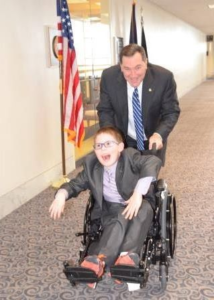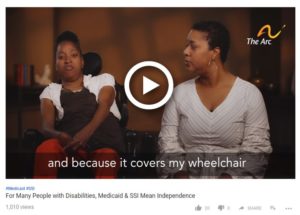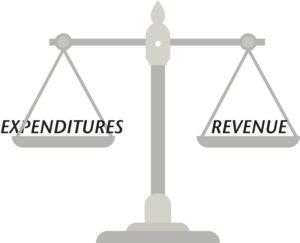This is a new series at The Arc Blog called #HandsOff. Each month, we will feature a story from individuals and families across The Arc’s network about how some of today’s key policy issues impact their day to day lives. ###

Spencer and Erica
My name is Erica, and my son Spencer and I live in Indianapolis, Indiana. I am a recruiter and Spencer is in the 5th grade.
Spencer is incredible. He has accomplished so much in 12 years. He was named the 2014 first ever Great American Museum Advocate by the American Alliance of Museums. He’s been a huge blues fan since the age of 3 and is the only kid to ever wish to meet BB King. He’s been to the White House and met Michelle Obama. His favorite subject to learn about is the civil rights movement. He loves magic and musicals, but if he had his choice he would spend all day sewing and making puppets. Incredible, right? Here is what makes his story even more incredible. He has done all of this with ½ of a brain.
Before Spencer was even born, he had a stroke. The stroke destroyed over 2/3 of the left side of his brain. He was diagnosed with Factor V Leiden blood clotting disorder, cerebral palsy, right side hemiparesis, seizure disorder, impulse control disorder and autism. Early on in the diagnosis I was told he would not walk or talk, and would undoubtedly have behavioral and impulse control issues. Not only does he walk but he can argue like a Supreme Court Justice. He functions with the use of only his left hand which leads to a lot of frustration. That coupled with the impulse control issues has made “behavior” his most difficult hurdle.
In April of 2016 when he was only 10, my worst nightmare as a mother became real.
Spencer was bruised from head to toe from punching himself. He was destroying our house daily and worst of all, he was saying he wanted to kill himself. He punched through two windows.

Spencer with Senator Donnelly (IN)
I was faced with the horrific decision of placing him in a 24-hour behavioral psychiatric unit. He had two five day stays within a month. It was the hardest time of our lives.
Once he got out of the psychiatric unit, Medicaid covered an additional 25 hours per week of intensive behavioral therapy. He was already getting a few hours a day covered at school, but getting the right amount of intensive therapy has made all the difference.
The additional Medicaid hours saved his life and at the very least kept him out of a long term facility and allowed him to work on learning coping skills in his natural environment.
Here we are not even two years later and because of that therapy through Medicaid, he is happy, healthy and controlling his anger and impulses. Medicaid has been a life saver for us.
Spencer is a different kid now. A much healthier and happier kid. Most importantly, he’s alive! We just came back from out 3rd trip to New York in a year. Two years ago, I couldn’t take him out of the house for fear he would hurt himself or someone else and now he navigates the bustling streets of New York like a native.
I asked Spencer what he would say to the Congress or the President about the importance of Medicaid in his life. Much more eloquent than I could ever hope to be, here is his response in his own words:
“No problem mom, they can just come to my house. Yeah. I’ll show them holes in the wall where I used to punch it. I’ll show them what used to be my quiet room and how you had to fill it with mats and glass I couldn’t break so I wouldn’t hurt you or myself. I’ll show them how now that room has no more of those things but now has my sewing machine because I’m a big boy and can control my anger. I’ll even tell them how I used to punch you because I was so mad all the time. I’ll tell them I broke your nose. I’ll show them that now I just have to work on my verbal junk but I don’t hit you anymore. I’ll show him everything mom and then they will understand. Just invite them over and I’ll show them. Tell them to bring all their friends. I’ll show them too.”
Mr. President, Members of Congress: you are cordially invited to my house at any date and time that works for you. Bring your friends. My 12 year old has some things he wants to show you.
 Meet Samera! Samera is 27 years old, a poet, and likes to read books, go to concerts, and spend time with her friends and family. She lives in a home in her community, supported by The Arc of Baltimore.
Meet Samera! Samera is 27 years old, a poet, and likes to read books, go to concerts, and spend time with her friends and family. She lives in a home in her community, supported by The Arc of Baltimore.


 A balanced budget amendment is a proposed federal constitutional rule requiring that the government not spend more than its income in a given year. Most state constitutions have balanced-budget provisions and most of these make an exception for times of war or national emergency, or allow the legislature to suspend the rule by a supermajority vote. The U.S. Constitution does not require a balanced budget. Some members of Congress are looking to change that by passing legislation to add an amendment to the U.S. Constitution.
A balanced budget amendment is a proposed federal constitutional rule requiring that the government not spend more than its income in a given year. Most state constitutions have balanced-budget provisions and most of these make an exception for times of war or national emergency, or allow the legislature to suspend the rule by a supermajority vote. The U.S. Constitution does not require a balanced budget. Some members of Congress are looking to change that by passing legislation to add an amendment to the U.S. Constitution. Meet Joe Damiano! Joe is 23 years old and is a very active advocate in his home state of New York. Joe is the outreach director for The Arc’s National Council of Self-Advocates, a board member for a local non-profit, and the former chair of a self-advocacy group called the Collaborative of New York.
Meet Joe Damiano! Joe is 23 years old and is a very active advocate in his home state of New York. Joe is the outreach director for The Arc’s National Council of Self-Advocates, a board member for a local non-profit, and the former chair of a self-advocacy group called the Collaborative of New York.









